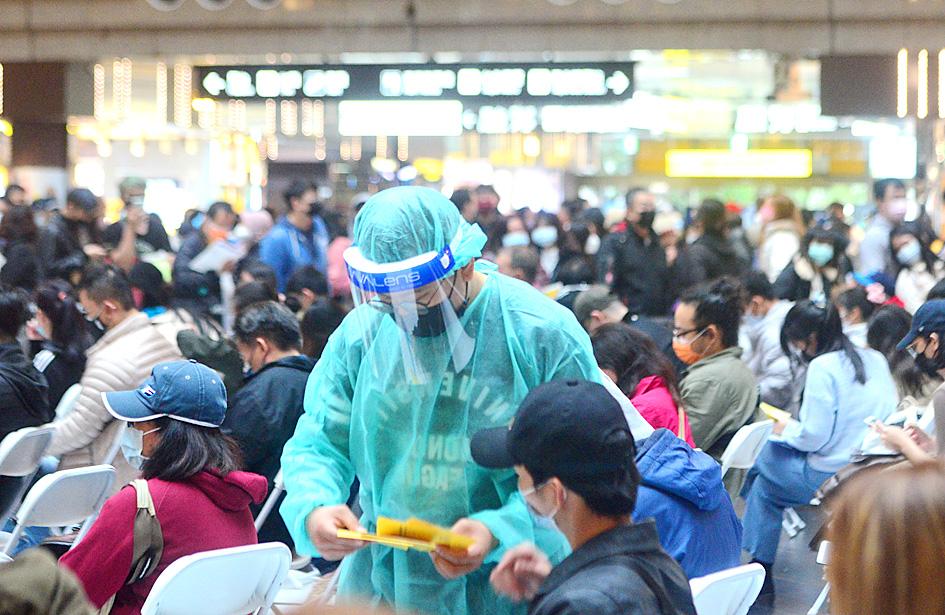The Central Epidemic Command Center (CECC) yesterday announced enhanced disease prevention measures for public transportation, business venues, religious venues and events, as well as the management of migrant workers, citing an increased risk of COVID-19 transmission in Taiwan.
The center yesterday reported 82 local cases, the highest daily number since June last year.
The majority of them can be traced to two clusters: one linked to employees — mainly migrant workers — at an electronics company in Taoyuan, and the other linked to a maintenance worker at the Port of Kaohsiung, the CECC said.

Photo: Wang Yi-sung, Taipei Times
Minister of Health and Welfare Chen Shih-chung (陳時中), who heads the center, said the two clusters have increased the risk of local transmission, so enhanced measures would be implemented nationwide.
Minister of Transportation and Communications Wang Kwo-tsai (王國材) said that starting today, eating and drinking would be banned on all public transport: airplanes, boats, buses and trains, including high-speed trains.
The only exceptions would be drinking water if needed physiologically, for taking medicine or breastfeeding, Wang said.

Photo: CNA
Public transport stations, national scenic areas and post offices have been asked to thoroughly implement contact registration and increase the frequency of environmental disinfection to meet the standards of a level 3 COVID-19 alert, he said, adding that additional cleaning and disinfection of handrails, buttons, restroom doorknobs and tray tables would be conducted.
Wang said the procedure of assigning international travelers to disease prevention taxis has been improved to ensure that there is no physical contact, and disease prevention vehicles would have their own completely separate areas at freeway rest stops.
Deputy Minister of Economic Affairs Chen Chern-chyi (陳正祺) said that his ministry has urged companies with facilities near clusters in Taoyuan or which have employees who are suspected of having been exposed to confirmed cases to conduct rapid COVID-19 testing of staff.
The ministry also encourages all companies nationwide, especially those with more than 100 employees, to conduct rapid COVID-19 testing of their employees, he said, adding that the ministry can help match companies with test kit manufacturers.
Chen Chern-chyi asked convenience stores, supermarkets and restaurants to thoroughly implement contact tracing, temperature measurement and other preventive measures.
It is suggested that employees of these businesses in Taoyuan take a rapid test for COVID-19, even if they are fully vaccinated.
Minister of the Interior Hsu Kuo-yung (徐國勇) said that as many people are expected to attend religious events during the Lunar New Year holiday, his ministry has asked religious groups to not hold events at which crowds would inevitably gather, such as pilgrimages, parades and incense stick offering races.
Religious groups must submit a COVID-19 safety plan and gain local government approval if they are to hold a religious event for more than 500 participants, he said, adding that contact tracing, temperature measurements and disinfection must be implemented.
Religious workers and visitors at religious venues and events must wear a mask at all times and are banned from eating or drinking. Religious venue staff must be fully vaccinated against COVID-19.
Visitor capacity at religious venues and events should be limited to a crowd density of one person per 2.25m² indoors and one person per 1m² outdoors, entrances and exits should be separated, and visitors must move through the venue in one direction and keep a proper social distance when lining up, Hsu said.
Meals at religious events can only be offered in sealed containers, and packing or eating the food on site is prohibited, he said, adding that as the venues are banned from providing divination sticks, divination blocks and food offering plates, people are encouraged to bring their own if they need to.
Accommodation for visitors at religious venues is limited to one person per room, or one family per room, he added.
Minister of Labor Hsu Ming-chun (許銘春) said that in response to the infection cluster at the Taoyuan company linked to two migrant workers who ate at a steakhouse where a cluster of infections has occurred, her ministry has asked their employers and recruitment agencies to cooperate with CECC testing and contact tracing.
The Taoyuan Department of Labor has inspected the migrant workers’ dormitory and found that it met disease prevention guidelines, she said, adding that the migrant workers who have been identified as close contacts of confirmed cases have been asked to stay in their dormitories for testing and contact tracing.
The employers and recruitment agencies would provide meals and other necessities for them, she said.
The Ministry of Labor has also launched response measures, including testing of employees at companies with 50 or more migrant workers, recruiting bilingual staff to assist in contact tracing, enhancing inspections, encouraging migrant workers to get fully vaccinated, and translating the CECC’s disease prevention information and sending it to migrant workers through multiple channels.

CHAOS: Iranians took to the streets playing celebratory music after reports of Khamenei’s death on Saturday, while mourners also gathered in Tehran yesterday Iranian Supreme Leader Ayatollah Ali Khamenei was killed in a major attack on Iran launched by Israel and the US, throwing the future of the Islamic republic into doubt and raising the risk of regional instability. Iranian state television and the state-run IRNA news agency announced the 86-year-old’s death early yesterday. US President Donald Trump said it gave Iranians their “greatest chance” to “take back” their country. The announcements came after a joint US and Israeli aerial bombardment that targeted Iranian military and governmental sites. Trump said the “heavy and pinpoint bombing” would continue through the week or as long

TRUST: The KMT said it respected the US’ timing and considerations, and hoped it would continue to honor its commitments to helping Taiwan bolster its defenses and deterrence US President Donald Trump is delaying a multibillion-dollar arms sale to Taiwan to ensure his visit to Beijing is successful, a New York Times report said. The weapons sales package has stalled in the US Department of State, the report said, citing US officials it did not identify. The White House has told agencies not to push forward ahead of Trump’s meeting with Chinese President Xi Jinping (習近平), it said. The two last month held a phone call to discuss trade and geopolitical flashpoints ahead of the summit. Xi raised the Taiwan issue and urged the US to handle arms sales to

BIG SPENDERS: Foreign investors bought the most Taiwan equities since 2005, signaling confidence that an AI boom would continue to benefit chipmakers Taiwan Semiconductor Manufacturing Co’s (TSMC, 台積電) market capitalization swelled to US$2 trillion for the first time following a 4.25 percent rally in its American depositary receipts (ADR) overnight, putting the world’s biggest contract chipmaker sixth on the list of the world’s biggest companies by market capitalization, just behind Amazon.com Inc. The site CompaniesMarketcap.com ranked TSMC ahead of Saudi Aramco and Meta Platforms Inc. The Taiwanese company’s ADRs on Tuesday surged to US$385.75 on the New York Stock Exchange, as strong demand for artificial intelligence (AI) applications led to chip supply constraints and boost revenue growth to record-breaking levels. Each TSMC ADR represents

Pro-democracy media tycoon Jimmy Lai’s (黎智英) fraud conviction and prison sentence were yesterday overturned by a Hong Kong court, in a surprise legal decision that comes soon after Lai was jailed for 20 years on a separate national security charge. Judges Jeremy Poon (潘兆初), Anthea Pang (彭寶琴) and Derek Pang (彭偉昌) said in the judgement that they allowed the appeal from Lai, and another defendant in the case, to proceed, as a lower court judge had “erred.” “The Court of Appeal gave them leave to appeal against their conviction, allowed their appeals, quashed the convictions and set aside the sentences,” the judges